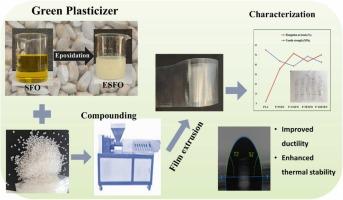环氧红花油:聚乳酸膜生物增塑剂的合成及性能评价
IF 5.6
1区 农林科学
Q1 AGRICULTURAL ENGINEERING
引用次数: 0
摘要
由于对环境的关注,生物基聚合物配方在食品包装等大规模应用中的应用出现了新的趋势。聚乳酸(PLA)是一种重要的生物聚合物,由于其脆性和延展性差,在工业应用中受到限制。为了克服这些缺点,生物友好油被用作增塑剂,以改善整体属性并扩大其作为潜在软包装材料的用途。本文采用原位Prilezhaev反应成功地对红花油进行了环氧化。1h NMR和FTIR分析表明,最佳条件为温度70℃,停留时间30 min,最大选择性为96 %。通过熔融共混和铸膜挤出制备了SFO和ESFO改性PLA薄膜。研究了油脂对聚乳酸的结构、力学和热性能的影响。形态学分析表明,PLA-ESFO (5phr)薄膜的表面更光滑,热稳定性、防潮性和疏水性也得到了改善。此外,拉伸性能强调了两种油的延展性的显著改善,特别是在5 phr esfo基薄膜中,在不影响拉伸强度和模量的情况下,比纯PLA提高了21倍。因此,环氧化的红花油发挥塑化作用,鼓励PLA作为可生物降解的包装材料的可能性。本文章由计算机程序翻译,如有差异,请以英文原文为准。

Epoxidized safflower oil: Synthesis and evaluation of its performance as bioplasticizer for polylactic acid films
There is an emerging trend towards the utilization of biobased polymer formulation for massive applications like food packaging due to environmental concerns. Polylactic acid (PLA), a significant biopolymer, has faced limitations in industrial applications due to its brittleness and poor ductility. To overcome these drawbacks, bio-friendly oils have been employed as plasticizers, to ameliorate overall attributes and expand their use as a potential flexible packaging material. In this work, Safflower oil (SFO) was successfully epoxidized (ESFO) using an in-situ Prilezhaev reaction. 1 H NMR and FTIR analysis indicated that the optimal conditions were a temperature of 70 °C and a residence time of 30 min, resulting in a remarkable maximum selectivity of 96 %. Further, SFO and ESFO modified PLA films were obtained by melt blending and cast film extrusion. The effect of oils on structural, mechanical and thermal properties of PLA was examined. Morphological analysis revealed a smoother surface along with improved thermal stability, moisture barrier, and hydrophobicity for PLA-ESFO (5 phr) films. Additionally, tensile properties emphasized the significant improvement in ductile properties for both the oils, particularly marked in 5 phr ESFO-based films, where 21 folds improved than neat PLA without compromising tensile strength and modulus. Therefore, epoxidized safflower oil exerted plasticization, encouraging the likelihood of PLA as a biodegradable packaging material.
求助全文
通过发布文献求助,成功后即可免费获取论文全文。
去求助
来源期刊

Industrial Crops and Products
农林科学-农业工程
CiteScore
9.50
自引率
8.50%
发文量
1518
审稿时长
43 days
期刊介绍:
Industrial Crops and Products is an International Journal publishing academic and industrial research on industrial (defined as non-food/non-feed) crops and products. Papers concern both crop-oriented and bio-based materials from crops-oriented research, and should be of interest to an international audience, hypothesis driven, and where comparisons are made statistics performed.
 求助内容:
求助内容: 应助结果提醒方式:
应助结果提醒方式:


